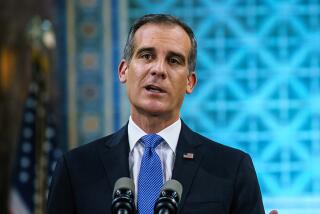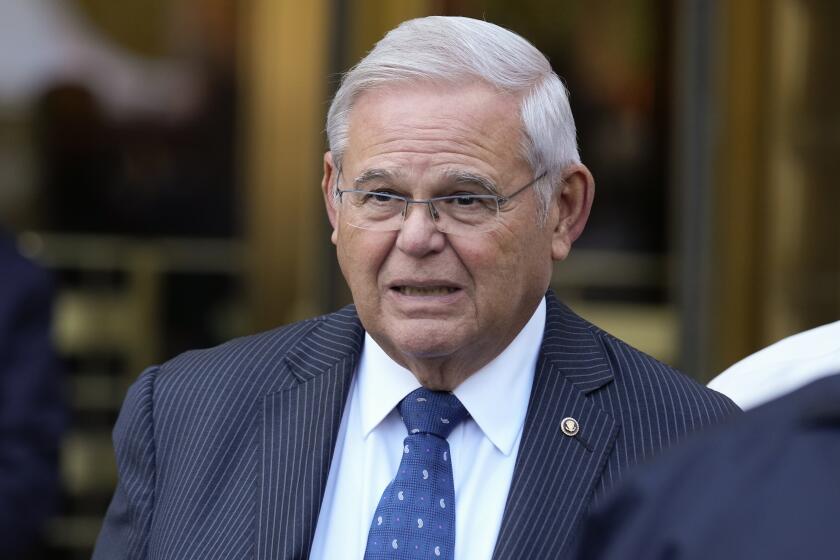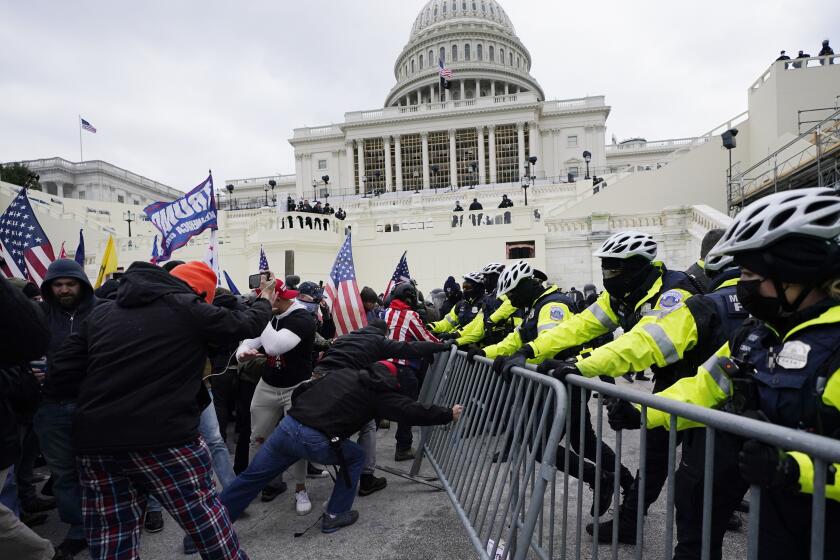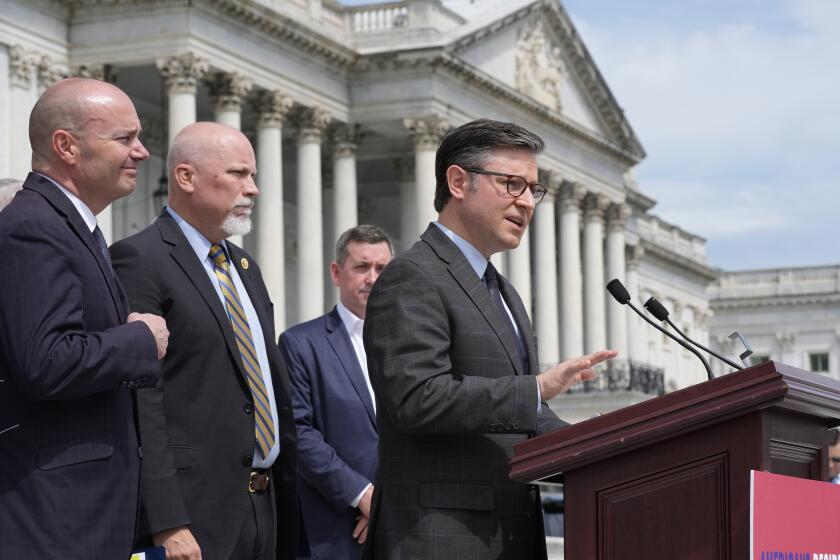Tax Plan Barely Passes in House : Economy: Bush again vows to veto the Democratic bill, which would raise levies on the rich to pay for cuts elsewhere. A rival Republican package was killed.
The House voted, 221 to 209, Thursday to approve a Democratic alternative to President Bush’s package of election-year tax cuts, but the unusually close margin embarrassed the Democratic leadership and virtually ensured a presidential veto.
The Democratic measure was adopted after the House voted, 264 to 166, to kill a rival Republican plan containing a streamlined version of the economic stimulus package that Bush had asked Congress to pass by March 20 in an effort to combat the recession.
The Democrats’ bill, which features a tax credit for working Americans financed by higher taxes on the rich, now goes to the Senate for consideration. The Senate Finance Committee is scheduled to begin work Tuesday on a similar, although smaller, tax cut package.
Bush, who was attending a seven-nation drug meeting in San Antonio, Tex., quickly issued a statement reiterating that there is “no question” that he will veto the Democratic bill.
“Instead of voting to provide greater opportunities for all Americans, (the House) voted to saddle the economy with a $100-billion tax increase,” Bush said, referring to about $93 billion in tax increases on the rich that would be used to pay for tax cuts elsewhere.
The centerpiece of the Democratic bill is a temporary tax credit of $200 per person, or $400 per couple, for middle-income Americans subject to Social Security withholding taxes. The credit would be available for two years only.
The measure would allow first-time home buyers to claim a temporary tax credit of up to $5,000, and to use up to $10,000 in individual retirement account funds to make down payments. It would permit IRA withdrawals for medical or educational expenses and deductions for interest on student loans.
The plan would provide the same faster write-offs that Bush proposed for investment in new plants and equipment. Instead of the blanket capital gains tax cut requested by Bush, it would exempt that part of investment gains attributable to inflation and provide a bigger cut for profits on small growth-company stocks.
To help pay for these reductions, the plan would raise taxes on higher-income Americans, imposing a new 35% maximum tax rate--instead of the 31% now in effect--for individuals with taxable incomes of more than $85,000 and couples with incomes of more than $145,000.
It also would add a 10% “millionaire’s” surtax on all income of more than $1 million a year--a move that translates into a 38.5% top tax rate on that part of millionaires’ incomes.
The narrow victory margin in the House came despite an 11th-hour campaign by Speaker Thomas S. Foley (D-Wash.) and Majority Leader Richard A. Gephardt (D-Mo.), who personally telephoned more than 30 undecided Democrats to plead with them to support the plan.
Even so, 46 Democrats voted against the leadership’s tax package and three abstained. Some lawmakers waited until House leaders were sure that the proposal would pass before actually casting their ballots against the bill. Except for those defections, the vote was essentially along party lines.
Democratic leaders said Foley and Gephardt had warned would-be defectors that, if the Democratic plan was voted down, Bush would be able to go “on tonight’s 6 o’clock news” and blame Democrats for standing in the way of an economic recovery.
“A lot of people understood that this was one of the most important votes--the most important vote--of the year,” said Rep. Vic Fazio (D-West Sacramento). “It would go to the very question of can the Democrats really govern.”
The two sides are in a contest to see which will be able to use the tax-cut issue most effectively during the election campaign. The Democrats hope to goad Bush into vetoing their plan so they can blame him for derailing it. He wants to blame them for scrapping his.
Nevertheless, the thin show of support heightened prospects that the bill might never make it into law, since Democrats clearly will not be able to muster the two-thirds majority needed to override a presidential veto.
Clearly perturbed by the Democratic action, Bush told reporters after a news conference in San Antonio that House Democrats had sought to “go politically one-up” by rejecting his economic recovery plan and substituting their own.
“Put me down as dissatisfied, yes,” Bush said. “Terrible. It’s so political and so disappointing to the American people.”
But Bush held out hope for more favorable action in the Senate, saying that it is important to “keep trying, keep working, keep pressing for something that will help.”
The lukewarm reception by many Democrats to their own package reflects a widespread fear by lawmakers that the tax cuts would not really help the economy and might even blunt a recovery by increasing the federal budget deficit and sending interest rates up again.
That view was voiced repeatedly by economists, and polls have shown that many voters appear to share their apprehensions. Even organized labor eventually opposed the tax reductions, arguing that Congress should increase spending for public works projects instead.
House leaders conceded that as late as Tuesday morning only 100 Democrats were on record as willing to support the bill. By 10 a.m. Thursday, after the telephone calls by Foley and Gephardt, that number had risen to just 198.
Just before the lawmakers voted, Foley reinforced his personal plea to Democrats in a floor speech, warning that “the worst choice would be to do nothing” and allow Bush to blame the party for stifling economic recovery.
He also suggested that Democrats might be able to eliminate provisions they found objectionable after the Senate passes its own version of the bill and the measure goes to a House-Senate conference committee. “You will have another opportunity,” he said.
Apart from the middle-income tax cut, many of the Democratic provisions parallel those proposed by Bush. The streamlined version of Bush’s package voted down by the House contained seven tax-cut proposals that the President had asked Congress to enact on a priority basis to help spur the economy.
Included were provisions to cut the maximum capital-gains tax rate to 15.4% from 28%, to allow businesses faster write-offs for new plants and equipment, to provide a $5,000 tax credit and penalty-free IRA withdrawals for first-time home buyers and to help real estate operators.
House Minority Leader Robert H. Michel (R-Ill.) contended that the streamlined version of Bush’s bill would create more jobs, whereas the Democratic alternative would only “raise taxes, lose jobs and hurt the economy.”
On Wednesday, the Democratic majority defeated a broader version of Bush’s proposal containing the full range of tax-cut proposals that the President had proposed in his State of the Union address Jan. 28.
Republicans had complained that the measure--actually introduced by Democrats after Bush shelved some of his earlier proposals in favor of the streamlined GOP package--would hurt the economy because it omitted companion spending cuts that Bush had proposed.
Times staff writer Douglas Jehl in San Antonio contributed to this story.
Democrats’ Tax Package
Here are some of the major elements of the new Democratic tax cut package that was approved by the House on Thursday:
Relief for Middle Class
A temporary, two-year tax credit equal to 20% of the employee’s share of Social Security payroll taxes. The maximum annual credit would be $200 for individuals and $400 for couples. Distributed as a cash payment if workers do not earn enough to benefit from a credit.
A tax credit for students or parents amounting to 15% of the interest they pay on student loans. The maximum would be $300 in most cases, or up to $500 if the interest equals 10% or more of the borrower’s income. Not available to parents making more than $70,000.
A waiver to allow those who have individual retirement accounts to use up to $10,000 of those savings--double what President Bush has proposed--for first-time home purchases or education or medical expenses, without incurring a 10% early withdrawal penalty.
Automatic adjustment for inflation of the $125,000 exemption for profits from the sale of a principal residence by taxpayers over 55 years of age. The plan also would extend the exclusion to taxpayers who are permanently and totally disabled.
A six-month extension of an existing tax break that allows self-employed persons to deduct 25% of the cost of maintaining medical insurance. The provision otherwise would expire in June.
Higher Taxes for Rich
A new 35% maximum tax rate, instead of the current 31% rate, plus limitations on other tax benefits, for individuals with taxable incomes over $85,000, heads of household with incomes of $125,000 and couples with incomes of $145,000.
A 10% “millionaire’s” surtax, or extra tax, on all income above $1 million a year. This translates into a 38.5% top tax rate on that portion of millionaires’ incomes. There also would be a 2.5% surtax on income over $1 million subject to the alternative minimum tax.
A cap of $1 million a year on corporate deductions for the salaries and fringe benefits provided to each of their top company executives. The provision is a response to recent criticism that some U.S. executives are overpaid.
Repeal of Luxury Tax
Repeal of the 10% excise tax on luxury boats, private airplanes, jewelry and furs enacted as a soak-the-rich measure in the 1990 budget accord but later found to have hurt boat makers and other industries.
Modest relief for importers of luxury automobiles by automatically adjusting for inflation each year the current $30,000 minimum price at which the tax takes effect.
Extending to powerboats the extra 1-cent-a-gallon tax on diesel fuel now imposed only on fuel used in trucks.
Source: Times staff reports
More to Read
Get the L.A. Times Politics newsletter
Deeply reported insights into legislation, politics and policy from Sacramento, Washington and beyond. In your inbox three times per week.
You may occasionally receive promotional content from the Los Angeles Times.






